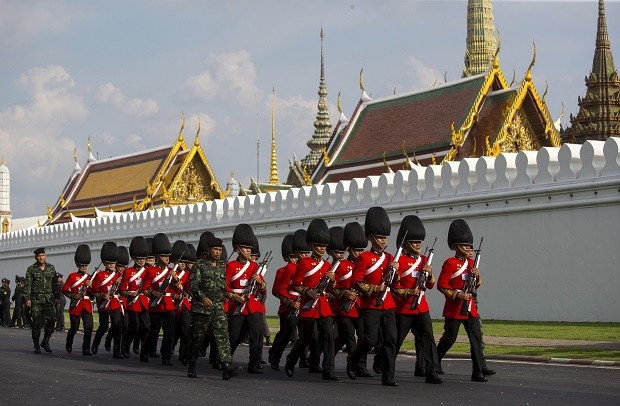
Thai Royal Guard march outside the Grand Palace Friday, Oct. 14, 2016 prior to a religious ceremony for the late King Bhumibol Adulyadej in Bangkok, Thailand. Bhumibol, the world’s longest reigning monarch, died on Thursday at the age of 88. AP
BANGKOK — Concerts and colossal beach parties in Thailand have been canceled. An annual floating lantern festival meant to placate the country’s goddess of water will not take place.
And closed for the first time in years: red-light districts in the heart of the Thai capital filled with seedy go-go bars so irrepressible they managed to stay open even through past military coups.
The death Thursday of Thailand’s revered King Bhumibol Adulyadej has plunged this Southeast Asian nation into an unprecedented period of mourning, and it is likely to stay that way for some time.
But calm — not chaos — prevails, and the closures are unlikely to last more than a few weeks or have any serious long-term impact on tourism or the country’s stunning beach resorts, which remain open.
While the military government has issued no specific guidance to anxious foreigners, Prime Minister Prayuth Chan-ocha has made clear that life must go on. The government declared Friday a public holiday to give Thais a chance to grieve, but Prayuth said businesses should remain open to ensure the nation does not “lose its credibility.”
Tourism accounts for about 10 percent of government revenue and 30 million visitors a year. It is among the few bright spots in an economy that has slumped since the army ousted a democratically elected government in 2014.
READ: Likely impact of Thai king’s death on economy unclear
Bhumibol, who passed away at the age of 88, was monarch for 70 years — so long that most Thais have known no other. He was deeply beloved, and his loss was felt nationwide, visible in the tears of millions of residents who dressed in black and revered him as a father figure. On Friday, thousands of tearful mourners gathered outside Bangkok’s gold-gilded Grand Palace, one of the nation’s top tourist attractions, to await the arrival of the king’s body in a royal procession at the Temple of the Emerald Buddha, or Wat Phra Kaew.
The government declared a one-year mourning period together with a 30-day moratorium on state and official events. It also urged people to refrain from organizing entertainment events for a month.
Canada called on its citizens to “refrain from any behavior that may be interpreted as festive, disrespectful or disorderly,” while Britain urged its nationals to “respect the feelings and sensitivities of the Thai people at this time … (and) wear somber and respectful clothing when in public.”
The U.S. Embassy called on Americans “visiting or residing in Thailand to join us in showing respect by maintaining decorum during this extended period of profound mourning.”
No foreign government advised its nationals to cancel trip plans.
Despite a subdued atmosphere, most bars and restaurants in Bangkok remained open late Thursday across the capital, and alcohol flowed freely. Some, though, shut on their own or were instructed to do so by authorities.
Bangkok’s Nana Plaza, a three-story complex of go-go bars filled with scantily-clad women that is popular with sex tourists, announced Friday it was closing to “pay respect and mourn the passing of His Majesty King Bhumibol Adulyadej the Great.” Soi Cowboy, another prominent red-light district in Bangkok, was also shut.
In the capital’s Thonglor neighborhood, one businessman said police ordered his nightclub to close and told him several other bars and restaurants he ran needed to remain low key.
“Concerts, clubs, anything that makes a party must remain shut. Restaurants can still serve food and alcohol, but loud music is not allowed, no live bands,” he said, recounting orders given by the police. He asked not to be identified because he feared authorities could shut his remaining businesses if he is seen as being critical.
On Thursday, Richard Barrow, a Bangkok-based travel blogger, tweeted: “Many tourists asking if they should cancel their holiday. Some ask if the situation is dangerous. There is no reason at this time to cancel.”
Still, some tourists’ plans to see particular events may already be ruined.
In the northern city of Chiang Mai, the city government announced the annual Yi Peng Festival set for mid-November — in which tens of thousands of lanterns float into the sky — has been canceled.
On the island of Koh Phangan, organizers of the renowned “Full Moon” party, which had been set to begin Oct. 17, called the event off.
And in Bangkok, a sold-out concert featuring British singer Morrissey, the former frontman of The Smiths, was also canceled.
Khaosod English, a local media outlet which reported numerous cancellations in the capital, offered prudent advice to its readers for upcoming events: “Call ahead first.”